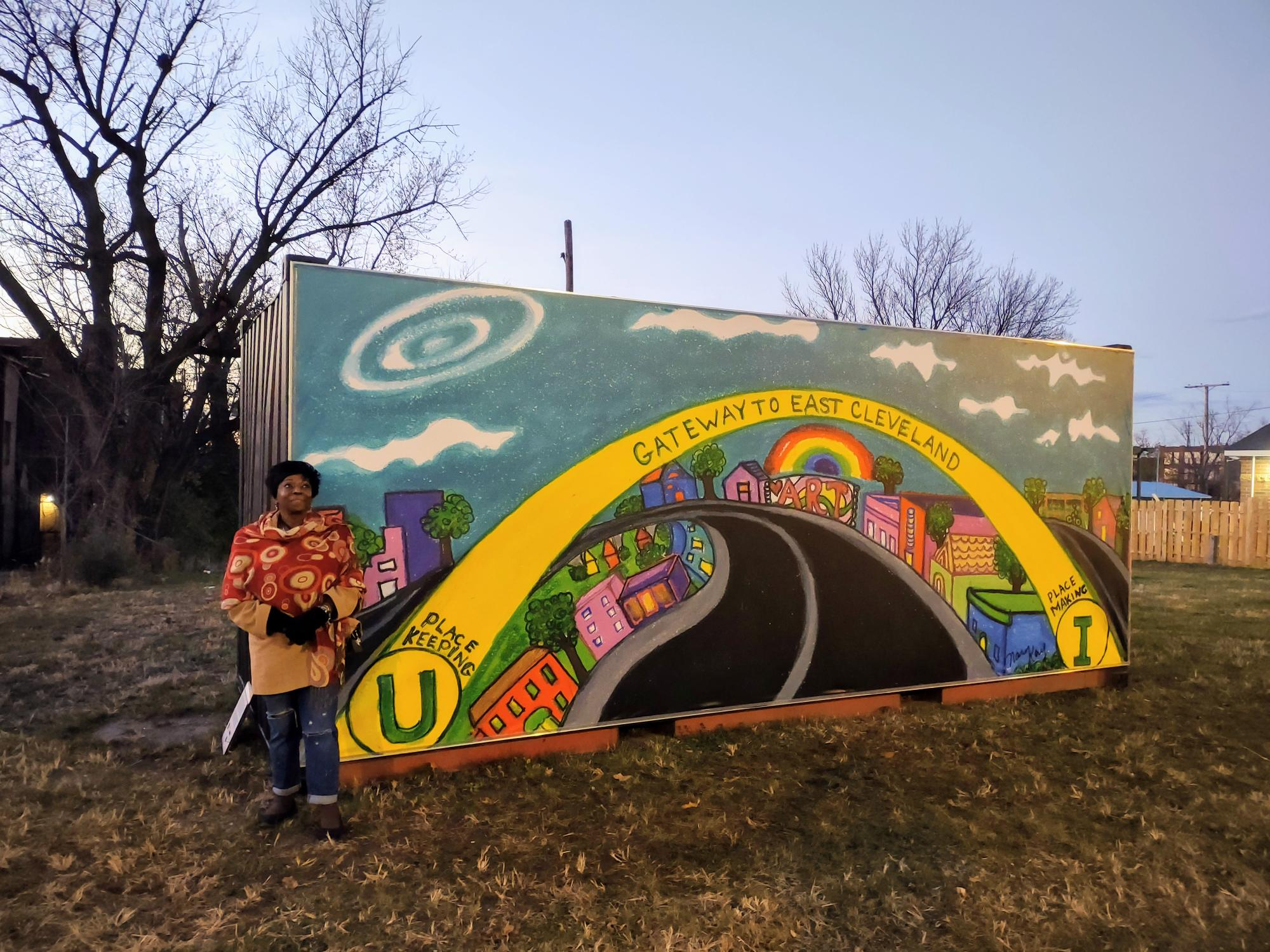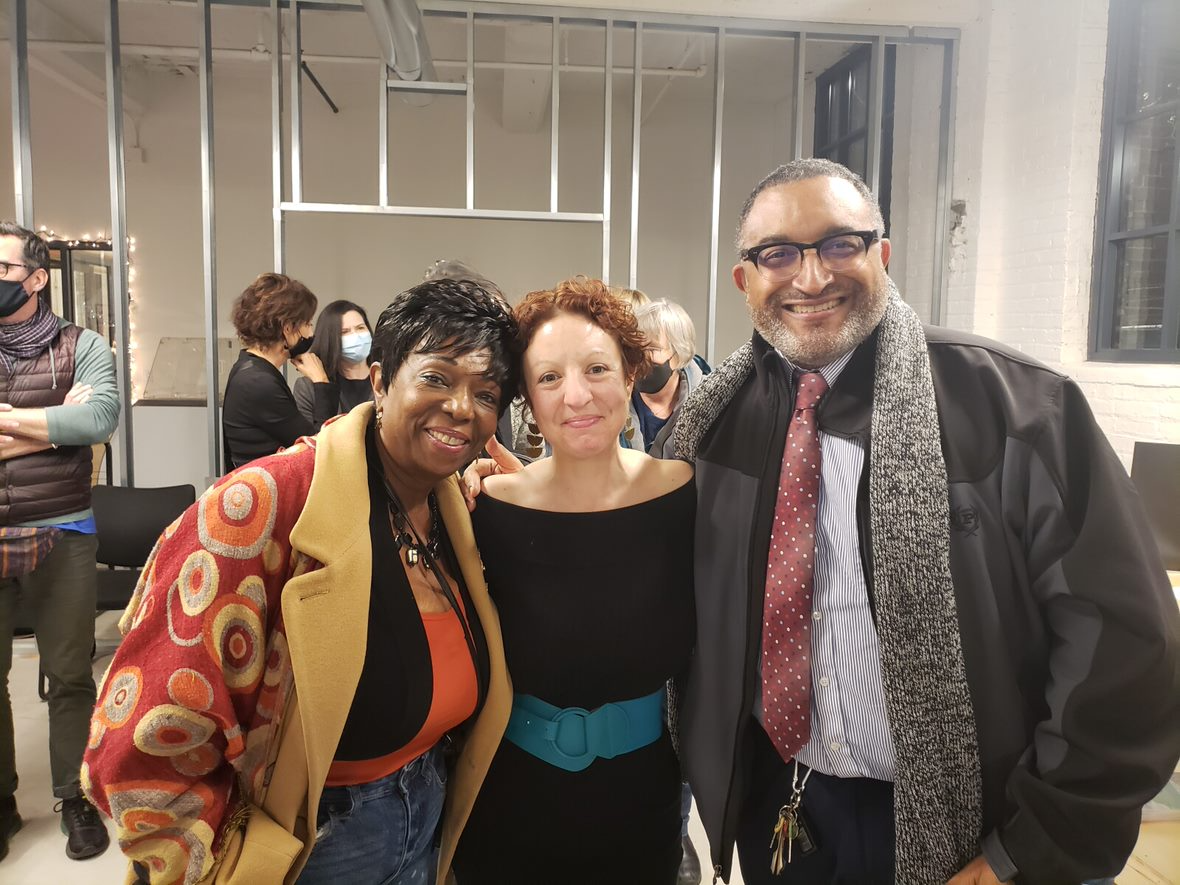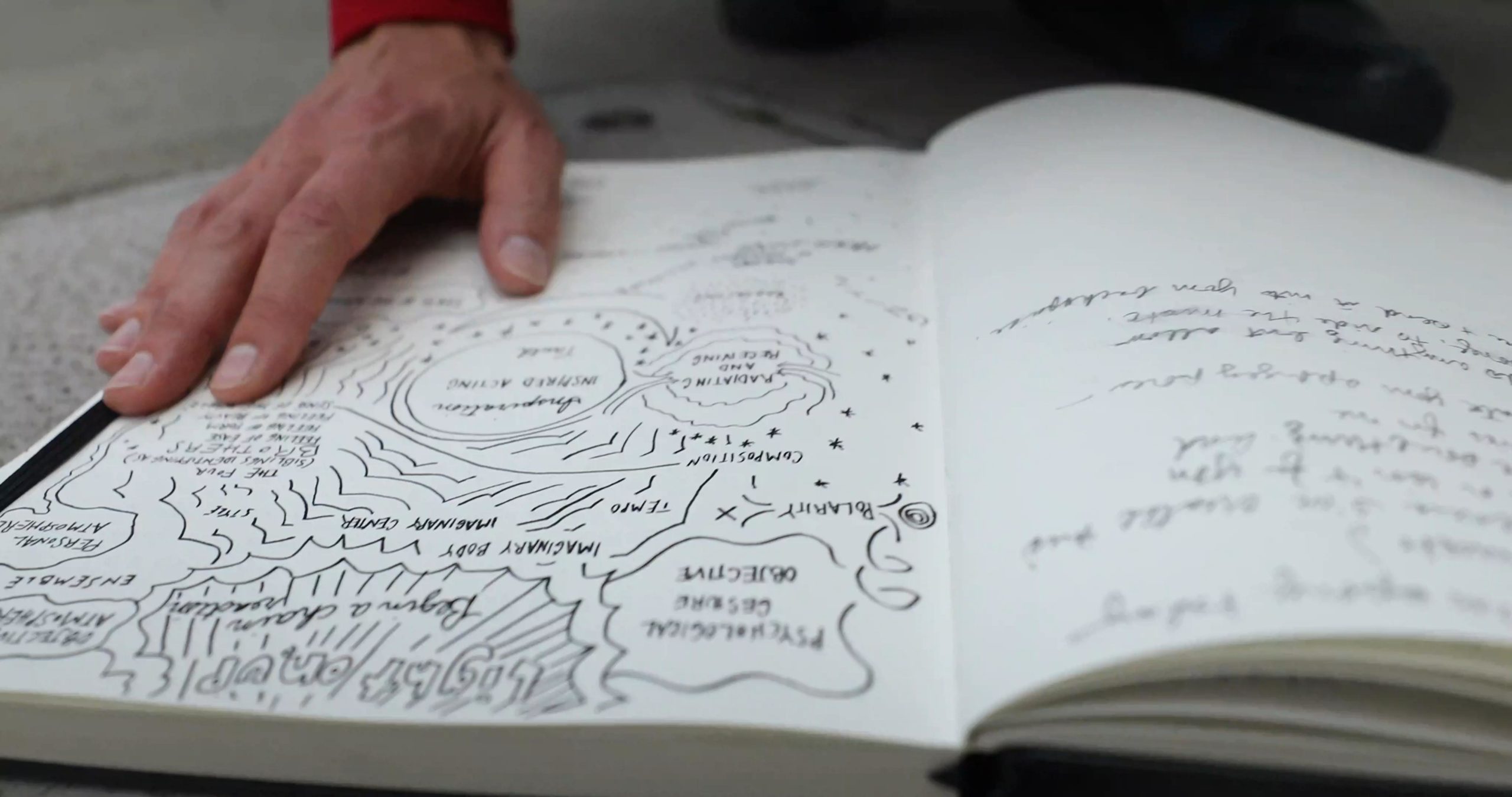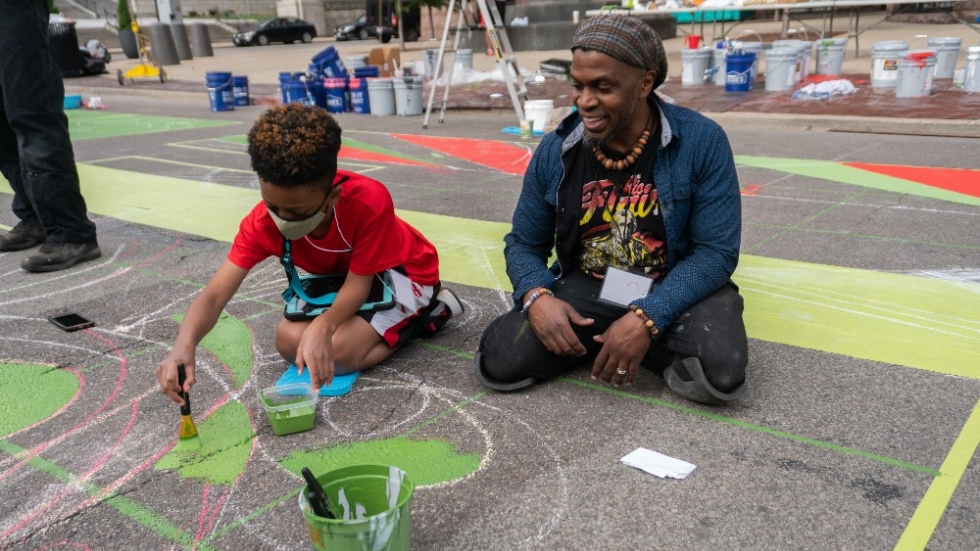Huntington Bank & City of Cleveland Announce Entrepreneurship Program to Help Region's Small Businesses Grow
Entrepreneurs in Residence Powered by Huntington will provide services from 11 nonprofits and City Hall
CLEVELAND, Jan. 26, 2022 -- Huntington National Bank and the City of Cleveland today announced a new initiative to help small businesses grow and positively impact the economy in the greater Cleveland region and neighboring communities. The Entrepreneur in Residence Powered by Huntington program involves a partnership between Huntington and 11 nonprofit organizations in Cuyahoga, Lorain, and Ashtabula counties. The nonprofits – each chosen for their expertise in supporting small business growth – will provide coaching and skills-training to help small businesses start and or grow their businesses while expanding their abilities to succeed.
One of the participating organizations in the Entrepreneurs in Residence Powered by Huntington program will be housed at Cleveland City Hall in partnership with Mayor Justin M. Bibb and Cleveland Neighborhood Progress. The City Hall-based Entrepreneur in Residence will focus on minority business development on the southeast side of Cleveland. The Resident will work to bring initiatives such as the neighborhood retail assistance program and the storefront development program to the Lee/Harvard, Mount Pleasant, and Union Miles neighborhoods of Cleveland.
"Small and minority owned businesses will drive our economic recovery. The Entrepreneur in Residence Powered by Huntington program will provide us with the opportunity to support local businesses on the southeast side and connect them to resources inside and outside of City Hall," said Mayor Justin M. Bibb, City of Cleveland. "This program highlights our commitment to putting people and neighborhoods first."
Huntington's 11 nonprofit partners will provide programming ranging from supporting minority real estate development contractors, manufacturers, and immigrant entrepreneurs to students and youth. Programs will include business coaching, financial management, digital technology skills, business planning, business growth, marketing, sales, revenue strategies, and more. Many of the programs focus on minorities and women.
"During listening sessions that we conducted last year, our partners shared the critical need for supporting under-resourced small business owners. We know that access to capital is a key part of helping small businesses grow and thrive," said Sean Richardson, greater Cleveland regional president of Huntington. "Entrepreneur in Residence Powered by Huntington is designed to leverage the expertise of our nonprofit partners to help small businesses expand their skills."
In addition to the 11 nonprofit partners, Huntington works with five more organizations to present webinars, speakers, training, and articles to help small businesses access content and advice beyond the core programs. The City Club of Cleveland will offer programming that features entrepreneurs and small business owners throughout the year. The Greater Cleveland Partnership-COSE will offer content about access to capital for small businesses.
Following is a list of the 11 nonprofit partners participating in the Entrepreneurs in Residence Powered by Huntington program:
|
Nonprofit Partner |
Program description |
|
Lorain County Community College |
Small business development center 1:1 coaching |
|
MAGNET |
Iterator for manufacturing companies with new ideas or scaling up |
|
Cuyahoga Community College |
Online executive in residence and workshops, financial literacy |
|
Cleveland Neighborhood Progress- Village Capital Corp |
1) Cleveland City Hall Entrepreneur in Residence to focus on business growth in Cleveland's southeast neighborhoods |
|
Greater Cleveland Partnership-Economic Growth Foundation |
Minority business development assistance coach for businesses with $500,000 to $1 million in revenues |
|
Urban League of Greater Cleveland- UBIZ Venture Capital |
Youth entrepreneurship program |
|
ECDI |
Digital coach for small business owners through the Women's Business Center |
|
New Entrepreneurs Opportunity Fund |
Mentoring, advising, networking for start-ups in Ashtabula County |
|
Assembly for the Arts |
Supports arts businesses with monthly financial coaching and capitalization |
|
Global Cleveland |
Immigrant microenterprise startups and coaching |
|
President's Council |
Financial metrics dashboard for minority-owned entrepreneurial start-ups |
Entrepreneur in Residence Powered by Huntington aligns with Huntington's 2021 Strategic Community Plan, a commitment of more than $40 billion to address social, racial, environmental and economic inequities across the bank's footprint. The community plan will foster financial opportunities for consumers, businesses, and communities served by Huntington, with a focus on affordable housing, small business loans and increased capital to historically disadvantaged and low- to moderate-income communities.
Huntington will invest more than $500,000 in the Entrepreneur in Residence Powered by Huntington program.
About Huntington
Huntington Bancshares Incorporated is a $174 billion asset regional bank holding company headquartered in Columbus, Ohio. Founded in 1866, The Huntington National Bank and its affiliates provide consumers, small and middle-market businesses, corporations, municipalities, and other organizations with a comprehensive suite of banking, payments, wealth management, and risk management products and services. Huntington operates more than 1,100 branches in 12 states, with certain businesses operating in extended geographies. Visit Huntington.com for more information.
Request Fiscal Sponsorship
ASSEMBLE FOR THE GREATER GOOD
Not all community projects can afford to become their own nonprofit. The process requires time and resources that could otherwise devoted to the project itself. What’s more, this work is often ignited by members of the community who see a problem and are willing to create a solution out of their own pockets. We assemble for the greater good of the people. Through fiscal sponsorship, we can open access to grant funds for those incredible mission-driven projects. Foundations and some donors often solely fund tax exempt organizations for many important reasons—501(c)3 requires fiscal oversight of a board, public record-keeping, proof of public good, and comes with restrictions to certain activities such as lobbying.
Fiscal sponsorship allows approved projects to come under Assembly’s fiscal umbrella so that you can get to work, and we can help with financial oversight. The relationships with funders, creative freedom, ownership of intellectual property and project coordination all remain with the project creators.
If you have started a project for the greater good and are interested in applying for fiscal sponsorship, take a look at the process below.
Process
Step 1: Inquiry
An artist, creative business or community group contacts Assembly to discuss the potential of fiscal sponsorship for a project. If the mission sounds aligned, they may be asked to fill in a survey as part of step 2.
Step 2: Written Request
The potential project will complete an application form to help Assembly assess capacity to implement the project and adhere to general grant and funding requirements. This includes a brief summary of the project, a projected budget and timeline.
Step 3: Staff review
Assembly staff reviews the written project (see new project criteria below). Projects are assessed based on the project criteria as well as alignment with Assembly’s mission as well as any potential risks that may be associated with sponsoring the project.
Step 4: Meeting
Assembly staff meets with project leadership to discuss the project and agreement in more detail. Assembly offers a high-level view of the arts and culture sector and may provide insights, suggest partners, help solidify a project or serve as a “thought partner” in other ways based on the project.
Step 5: Signed Agreement
Each party reviews and signs a written agreement. No funds will be distributed or requested for any new projects without a signed written agreement. The agreement requires the project entity to have a primary contact person, a physical address, and its own legal, tax and accounting identity (typically EIN or SSN).
[To open a bank account in which Assembly will distribute funds, the project entity will be asked for an Employer Identification Number (EIN) or Social Security Number. To apply for an EIN, the project may fill out IRS Form SS-4 (https://tax-irs-ein.com/). Responsibility for adhering to the appropriate legal, accounting and tax obligations lies solely with the project entity.]
Project Funding Cycle
Individual Donations
Upon receiving a signed written agreement, Assembly develops a donation campaign page for the project to receive online, tax-deductible donations. The project entity will be given a discrete URL to distribute to potential donors.
Grant Applications
Project entities are responsible for researching and providing application material for all grant proposals. If Assembly is required to submit an application, the project entity is asked to provide evidence that it is poised for successfully acquiring the grant. This will help Assembly deploy resources where they will be most effective. Potential evidence may be:
- At least $500 procured or 25 distinct individual donations of $10 or more to the project through the donation page provided by Assembly
- The project has been previously funded or has been directly invited to apply by the funder
We simply ask for at least one week’s notice to apply for grant funding for existing sponsored projects and at least 3 weeks notice if you are requesting fiscal sponsorship with the intent to apply for a grant. The entity’s final materials must be provided at least 48 hours in advance of the application deadline.
Reporting / Disbursement
Once funds are available, Assembly can provide an initial disbursement to get things started based on the project needs. As those funds are spent down, we ask project entities to submit monthly financial reports with receipts. Assembly is required to maintain full discretion and control over donated funds. We use the receipts to account for all of the grant funds and as funds are spent down, Assembly continues to replenish project funds.
Exit Policy
We consider fiscal sponsorship an incubator. We love when projects are seen through to the end or even “graduate” to become their own tax-exempt nonprofit. The fiscal sponsorship relationship ends when the project is completed or when either group requests an exit in writing. The primary reason Assembly may end a relationship before then would be an activity that would jeopardize the organization’s nonprofit status such as backing a candidate for office or other restricted activities. Ultimately, continuing or discontinuing fiscal sponsorship is subject to the signed written agreement.
Criteria for New Projects
Assembly offers fiscal sponsorship for a limited number of projects that are aligned with its mission to convene, coordinate, and collaborate with everyone who lives and works in Greater Cleveland to strengthen and support those in the region who create, present, experience and appreciate all forms of arts and culture. In order to be considered for sponsorship, the project and must meet the following criteria.
Legal Criteria
- The project must fall within Assembly’s tax-exempt purpose including education, information gathering, supporting traditionally underserved communities, economic development and public policy.
- The project must be aligned with Assembly’s mission.
- The project may not conduct partisan political activities.
- The project may not conduct activities in support of or opposition to a candidate running for public office.
Project Criteria
In addition to the above legal requirements, Assembly will give priority to projects that meet one or more of the following criteria:
- The project is a collaboration of multiple organizations and requires a neutral intermediary to secure and manage financial contributions.
- Sponsorship would expand opportunities for artists of color or minority-owned arts businesses and nonprofits.
- The project expands accessibility to arts and culture for people with disabilities.
- The project exemplifies cross-sector partnerships of arts and culture with other community service sectors such as education, health, safety, neighborhoods, economic development, transportation, democracy, diplomacy and others.
- Project managers have relevant experience and/or include evidence that the project entity has the capacity to execute the proposed project.
Additional Services for Sponsored Projects
Promotion: Assembly lists all sponsored projects on its donation page and encourages donors to contribute to creative projects in our region. Additionally, Assembly launches a giving campaign once per year, typically in the Fall, promoting all sponsored projects.
Counsel: As staff capacity permits, Assembly offers specialized counsel for projects where expertise exists such as budgeting, funder relations, business strategy, potential partners, or other strategic support as needed.
Assembly for the Arts Launches Postcard Campaign Urging Cleveland to Use Portion of ARPA Funds for the Arts
Source: SCENE
Abstract: Cleveland’s recently formed Assembly for the Arts has hatched a postcard campaign to appeal to Cleveland city council to dedicate 2% of the city’s ARPA funding for arts and culture.
“We will creatively share with Cleveland’s 17 Councilmembers the power and the impact of the arts and culture in their respective districts,” said President and CEO of Assembly for the Arts, Jeremy A. Johnson. “Through art, we’ll represent the importance of investing in cultural workers and artists, nonprofit organizations, and cultural businesses. Collectively we are powerful tools to improve our city and to emerge from the COVID pandemic. We want to give creatives the opportunity to share with elected officials how putting the arts in ARPA is a priority for the city’s future.”
Nonprofit COVID-19 Recovery & Resiliency Survey
Overview
The Funders Collaborative on Covid Recovery (FCCR) has launched the Nonprofit COVID-19 Recovery and Resiliency Survey to better understand the needs, opportunities, and makeup of the nonprofit sector in Cuyahoga county. The results of this survey will be used to develop nonprofit resilience strategies, advance equity, and help the community understand recovery needs post-COVID.
Timeline
To participate, please complete the survey between January 5 and January 28, 2022.
Results
Results of the survey will be available in May 2022, for both funders and nonprofits to understand: the issues different parts of the nonprofit sector are facing; the capacity needs and opportunities in different issue areas; existing program and focus areas; and opportunities for advancing nonprofits, as well as to understand the tireless leadership and workforce carrying out this crucial work in our region. Survey results will be published anonymized and in aggregate form, your individual response will not be shared with funders or others outside of the data analysis team.
Survey Length / Timing
This survey will take approximately 25 to 35 minutes to complete. At the end of the survey you will have an opportunity to leave feedback and to enter the raffle.
Win up to $5,000
Organizations that complete the survey will be eligible for a raffle for one of the following prizes: $5,000 (1 organization), $2,500 (2 organizations), $1,000 (10 organizations).
Survey Support
Review the Toolkit for Taking the Survey here. To download a full PDF version of the survey before beginning, please visit the FCCR website. If you have questions about the survey, or need support, please register and attend a TA Session.
Ohio artists and arts advocates lobby for ARPA funds
Source: Ideastream
Abstract:
Arts organizations across Ohio are lobbying local government officials to secure a share of American Rescue Plan Act (ARPA) funds. Nearly $2 trillion in stimulus money was assigned to cities across the country last year. As the President and CEO of ArtsWave, Alecia Kintner heads an organization that helped shepherd the arts and cultural life of the Cincinnati region since the 1920s. But she said a recent performance by actor Kelsey Steele carried a vital message from the 2020s. The Cincinnati native took his act to city hall.





